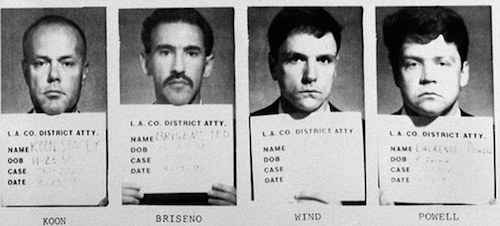Yesterday in the Washington Post, LAPD veteran and professor of homeland security Sunil Dutta published an editorial titled I’m a cop. If you don’t want to get hurt, don’t challenge me. Black Post subscribers throughout the nation dropped their newspapers and froze. A few were shot between one and 19 times. But that wasn’t anybody’s fault, because the cops are under a lot of stress—mostly from dealing with us all day. As Dutta puts it, “It’s not the police, but the people they stop, who can prevent a detention from turning into a tragedy.” Losing my goddamned mind after the jump.
- A detention is already a tragedy. You think it’s nothing because you do it all day, and no one ever does it to you.
- It is the people police stop who can prevent a detention from turning into a fistfight. It is the guy with what Dutta calls “the lethal (and nonlethal) hardware resting in my duty belt” who prevents bullets and pepper spray from flying through the air. On the journey from detention to tragedy, the cop takes both the first and the last step.
I should not fear for my life because I challenged the authority of a cop. Cops sometimes stop you when you have not done anything wrong. Some cops can be kind of mean. Occasionally, cops take off their badges and arrest reporters. These are situations in which the police detain us unjustly, but Dutta can’t believe we’re such babies about it:
Even though it might sound harsh and impolitic, here is the bottom line: if you don’t want to get shot, tased, pepper-sprayed, struck with a baton or thrown to the ground, just do what I tell you. Don’t argue with me, don’t call me names, don’t tell me that I can’t stop you, don’t say I’m a racist pig, don’t threaten that you’ll sue me and take away my badge. Don’t scream at me that you pay my salary, and don’t even think of aggressively walking towards me. Most field stops are complete in minutes. How difficult is it to cooperate for that long?
The good news is we finally have something to inscribe on the headquarters of the Department of Homeland Security. Still, a lot of the behaviors Dutta cites—such as arguing, telling him he can’t stop you, and threatening to sue—are legal ways to respond to a police officer. But if you do them he might shoot, tase, pepper spray, strike and throw you, and it’ll be your fault for not just shutting up and lying on the ground for a few minutes.
Here we encounter a theme we touched on yesterday. When the public uses violence, it is a transgression the law has no choice but to punish with overwhelming force. But when the public resists in any other way, it justifies police violence. Violence is the cause of and solution to most disagreements between the public and the police—philosophically in Dutta’s reasoning, and literally in Ferguson.
It takes a nimble logic to insist that the person not holding the gun and pressurized acid is ultimately responsible for making sure no one gets shot/sprayed. But Dutta keeps it up until the end, when he founders on the rocky precision of the English sentence:
Community members deserve courtesy, respect and professionalism from their officers. Every person stopped by a cop should feel safe instead of feeling that their wellbeing is in jeopardy. Shouldn’t the community members extend the same courtesy to their officers and project that the officer’s safety is not threatened by their actions?
There’s a phrase that does not leap from the tongue unbidden: “project that the officer’s safety is not threatened by their actions.” Dutta has contorted his sentence to avoid touching the phrase “make officers feel threatened.”
The problem with that phrase is it kind of implies it’s the officers’ fault. Adults are responsible for their own feelings—particularly the adults we arm with pistols and send out into the city to look for trouble. If Dutta’s essential contention is that police officers will shoot us if they feel threatened, it kind of sounds like he’s threatening us.
Here’s a fun thought experiment:
- A man with a badge but no gun says he knows you stole a TV and orders you to lie on the ground. You did not steal a TV. What do you do?
- A man with a gun but no badge says he knows you stole a TV and orders you to lie on the ground. You did not steal a TV. What do you do?
But if you really want to experiment with thinking, consider which scenario is more likely to end with someone getting shot.




